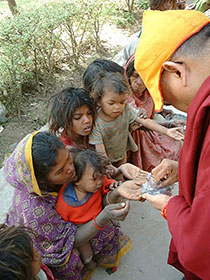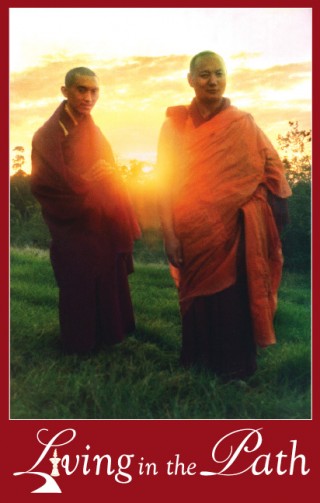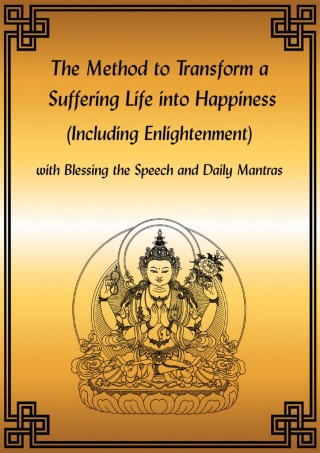- Home
- FPMT Homepage
Foundation for the Preservation of the Mahayana Tradition
The FPMT is an organization devoted to preserving and spreading Mahayana Buddhism worldwide by creating opportunities to listen, reflect, meditate, practice and actualize the unmistaken teachings of the Buddha and based on that experience spreading the Dharma to sentient beings. We provide integrated education through which people’s minds and hearts can be transformed into their highest potential for the benefit of others, inspired by an attitude of universal responsibility and service. We are committed to creating harmonious environments and helping all beings develop their full potential of infinite wisdom and compassion. Our organization is based on the Buddhist tradition of Lama Tsongkhapa of Tibet as taught to us by our founders Lama Thubten Yeshe and Lama Thubten Zopa Rinpoche.
- Willkommen
Die Stiftung zur Erhaltung der Mahayana Tradition (FPMT) ist eine Organisation, die sich weltweit für die Erhaltung und Verbreitung des Mahayana-Buddhismus einsetzt, indem sie Möglichkeiten schafft, den makellosen Lehren des Buddha zuzuhören, über sie zur reflektieren und zu meditieren und auf der Grundlage dieser Erfahrung das Dharma unter den Lebewesen zu verbreiten.
Wir bieten integrierte Schulungswege an, durch denen der Geist und das Herz der Menschen in ihr höchstes Potential verwandelt werden zum Wohl der anderen – inspiriert durch eine Haltung der universellen Verantwortung und dem Wunsch zu dienen. Wir haben uns verpflichtet, harmonische Umgebungen zu schaffen und allen Wesen zu helfen, ihr volles Potenzial unendlicher Weisheit und grenzenlosen Mitgefühls zu verwirklichen.
Unsere Organisation basiert auf der buddhistischen Tradition von Lama Tsongkhapa von Tibet, so wie sie uns von unseren Gründern Lama Thubten Yeshe und Lama Thubten Zopa Rinpoche gelehrt wird.
- Bienvenidos
La Fundación para la preservación de la tradición Mahayana (FPMT) es una organización que se dedica a preservar y difundir el budismo Mahayana en todo el mundo, creando oportunidades para escuchar, reflexionar, meditar, practicar y actualizar las enseñanzas inconfundibles de Buda y en base a esa experiencia difundir el Dharma a los seres.
Proporcionamos una educación integrada a través de la cual las mentes y los corazones de las personas se pueden transformar en su mayor potencial para el beneficio de los demás, inspirados por una actitud de responsabilidad y servicio universales. Estamos comprometidos a crear ambientes armoniosos y ayudar a todos los seres a desarrollar todo su potencial de infinita sabiduría y compasión.
Nuestra organización se basa en la tradición budista de Lama Tsongkhapa del Tíbet como nos lo enseñaron nuestros fundadores Lama Thubten Yeshe y Lama Zopa Rinpoche.
A continuación puede ver una lista de los centros y sus páginas web en su lengua preferida.
- Bienvenue
L’organisation de la FPMT a pour vocation la préservation et la diffusion du bouddhisme du mahayana dans le monde entier. Elle offre l’opportunité d’écouter, de réfléchir, de méditer, de pratiquer et de réaliser les enseignements excellents du Bouddha, pour ensuite transmettre le Dharma à tous les êtres. Nous proposons une formation intégrée grâce à laquelle le cœur et l’esprit de chacun peuvent accomplir leur potentiel le plus élevé pour le bien d’autrui, inspirés par le sens du service et une responsabilité universelle. Nous nous engageons à créer un environnement harmonieux et à aider tous les êtres à épanouir leur potentiel illimité de compassion et de sagesse. Notre organisation s’appuie sur la tradition guéloukpa de Lama Tsongkhapa du Tibet, telle qu’elle a été enseignée par nos fondateurs Lama Thoubtèn Yéshé et Lama Zopa Rinpoché.
Visitez le site de notre Editions Mahayana pour les traductions, conseils et nouvelles du Bureau international en français.
Voici une liste de centres et de leurs sites dans votre langue préférée
- Benvenuto
L’FPMT è un organizzazione il cui scopo è preservare e diffondere il Buddhismo Mahayana nel mondo, creando occasioni di ascolto, riflessione, meditazione e pratica dei perfetti insegnamenti del Buddha, al fine di attualizzare e diffondere il Dharma fra tutti gli esseri senzienti.
Offriamo un’educazione integrata, che può trasformare la mente e i cuori delle persone nel loro massimo potenziale, per il beneficio di tutti gli esseri, ispirati da un’attitudine di responsabilità universale e di servizio.
Il nostro obiettivo è quello di creare contesti armoniosi e aiutare tutti gli esseri a sviluppare in modo completo le proprie potenzialità di infinita saggezza e compassione.
La nostra organizzazione si basa sulla tradizione buddhista di Lama Tsongkhapa del Tibet, così come ci è stata insegnata dai nostri fondatori Lama Thubten Yeshe e Lama Zopa Rinpoche.
Di seguito potete trovare un elenco dei centri e dei loro siti nella lingua da voi prescelta.
- 欢迎 / 歡迎
简体中文
“护持大乘法脉基金会”( 英文简称:FPMT。全名:Foundation for the Preservation of the Mahayana Tradition) 是一个致力于护持和弘扬大乘佛法的国际佛教组织。我们提供听闻,思维,禅修,修行和实证佛陀无误教法的机会,以便让一切众生都能够享受佛法的指引和滋润。
我们全力创造和谐融洽的环境, 为人们提供解行并重的完整佛法教育,以便启发内在的环宇悲心及责任心,并开发内心所蕴藏的巨大潜能 — 无限的智慧与悲心 — 以便利益和服务一切有情。
FPMT的创办人是图腾耶喜喇嘛和喇嘛梭巴仁波切。我们所修习的是由两位上师所教导的,西藏喀巴大师的佛法传承。
繁體中文
護持大乘法脈基金會”( 英文簡稱:FPMT。全名:Found
ation for the Preservation of the Mahayana Tradition ) 是一個致力於護持和弘揚大乘佛法的國際佛教組織。我們提供聽聞, 思維,禪修,修行和實證佛陀無誤教法的機會,以便讓一切眾生都能 夠享受佛法的指引和滋潤。 我們全力創造和諧融洽的環境,
為人們提供解行並重的完整佛法教育,以便啟發內在的環宇悲心及責 任心,並開發內心所蘊藏的巨大潛能 — 無限的智慧與悲心 – – 以便利益和服務一切有情。 FPMT的創辦人是圖騰耶喜喇嘛和喇嘛梭巴仁波切。
我們所修習的是由兩位上師所教導的,西藏喀巴大師的佛法傳承。 察看道场信息:
- FPMT Homepage
- News/Media
-
- Study & Practice
-
-
- About FPMT Education Services
- Latest News
- Programs
- New to Buddhism?
- Buddhist Mind Science: Activating Your Potential
- Heart Advice for Death and Dying
- Discovering Buddhism
- Living in the Path
- Exploring Buddhism
- FPMT Basic Program
- FPMT Masters Program
- FPMT In-Depth Meditation Training
- Maitripa College
- Lotsawa Rinchen Zangpo Translator Program
- Universal Education for Compassion & Wisdom
- Online Learning Center
-
- Prayers & Practice Materials
- Overview of Prayers & Practices
- Full Catalogue of Prayers & Practice Materials
- Explore Popular Topics
- Benefiting Animals
- Chenrezig Resources
- Death & Dying Resources
- Lama Chopa (Guru Puja)
- Lama Zopa Rinpoche: Compendium of Precious Instructions
- Lama Zopa Rinpoche: Life Practice Advice
- Lama Zopa Rinpoche Practice Series
- Lamrim Resources
- Mantras
- Prayer Book Updates
- Purification Practices
- Sutras
- Thought Transformation (Lojong)
- Audio Materials
- Dharma Dates - Tibetan Calendar
- Translation Services
- Publishing Services
- Ways to Offer Support
- Prayers & Practice Materials
-
- Teachings and Advice
- Find Teachings and Advice
- Lama Zopa Rinpoche Advice Page
- Lama Zopa Rinpoche: Compendium of Precious Instructions
- Lama Zopa Rinpoche Video Teachings
- ༧སྐྱབས་རྗེ་བཟོད་པ་རིན་པོ་ཆེ་མཆོག་ནས་སྩལ་བའི་བཀའ་སློབ་བརྙན་འཕྲིན།
- Podcasts
- Lama Yeshe Wisdom Archive
- Buddhism FAQ
- Dharma for Young People
- Resources on Holy Objects
- Teachings and Advice
-
-
*If a menu item has a submenu clicking once will expand the menu clicking twice will open the page.
-
-
- Centers
-
- Teachers
-
- Projects
-
-
-
-
*If a menu item has a submenu clicking once will expand the menu clicking twice will open the page.
-
-
- FPMT
-
-
-
-
-
Faith alone never stops problems; understanding knowledge-wisdom always does. Lord Buddha himself said that belief in Buddha was dangerous; that instead of just believing in something, people should use their minds to try to discover their own true nature.
Lama Thubten Yeshe
-
-
-
- Shop
-
-
-
The Foundation Store is FPMT’s online shop and features a vast selection of Buddhist study and practice materials written or recommended by our lineage gurus. These items include homestudy programs, prayers and practices in PDF or eBook format, materials for children, and other resources to support practitioners.
Items displayed in the shop are made available for Dharma practice and educational purposes, and never for the purpose of profiting from their sale. Please read FPMT Foundation Store Policy Regarding Dharma Items for more information.
-
-
Study & Practice News
18
Living in the Path Module, “The Secret of the Mind”
In this revised module of Living in the Path, “The Secret of the Mind,” Lama Zopa Rinpoche gives an extensive teaching on karma and the mind based on two verses from the Dhammapada (The Collection of Sayings), each of which begin with the line “Phenomena are created by the mind.”
Rinpoche explains that the philosophy of phenomena being created by the mind is unique to Buddhism, and that what this means is that every experience of suffering and happiness is the result of our own actions, or karma, which in turn come from our mind. “The secret of the mind” means the same as “Phenomena are created by the mind.” Rinpoche tells us that as long as we don’t know this important point, we won’t understand that abandoning suffering and achieving happiness have to come from our mind. On the other hand, when we do come to understand this, we will see that the experience of happiness and suffering is in our hands.
The materials for this module of Living in the Path are drawn from teachings given by Lama Zopa Rinpoche at Light of the Path 2010. The transcripts have been divided into ten short readings that are complimented by four short video excerpts of the teachings. An introductory video, “Mind: The Creator,” with Ven. Robina Courtin provides an engaging and informative overview of the subject of karma and the mind. To help students gain a deeper understanding and experience of the teachings, each reading begins with several questions that help to draw out the main points and encourage an active involvement with the teaching. In addition, the readings are supplemented with guidelines for meditating on the teaching, keeping it present throughout the day with a mindfulness practice, and offering service to others. Students who complete all the required readings, meditations, mindfulness and service practices are awarded a Certificate of Achievement.
For an overview of this module, see “Mind: The Creator,” with Ven. Robina Courtin:
https://youtu.be/YL_2yXFv-Mk
For the full module, see Living in the Path, “The Secret of the Mind.” The enrollment key to access this module is available as a benefit of becoming a Friend of FPMT at the Dharma Supporter level or higher. Alternatively, it can be purchased in the Foundation Store.
- Tagged: living in the path, the mind, ven. robina courtin, video
- 0
11
Taking the Eight Mahayana Precepts

1,000 Arm Chenrezig painting by Peter Iseli.
Lama Zopa Rinpoche recommends taking the 24-hour eight Mahayana precept vows on days on which the karmic effects of positive actions are multiplied, such as Buddha days, full moon, new moon, and eclipses.
The eight Mahayana precepts are a powerful and effective way for you to build, maintain and increase deep propensities for spiritual practice and attainment and thus is a profound method for giving meaning to your precious human life. Lama Zopa Rinpoche quotes this passage from the King of Concentration Sutra:
“For ten billion eons equaling the number of sand grains in the Pacific Ocean, if one offers umbrellas, flags, garlands of light offerings, food and drink with a calm mind, or offers service to one hundred billion times ten million buddhas, when the holy Dharma has become extremely perished and the teachings of the Gone to Bliss One have stopped, if somebody who is enjoying (living in) one vow for one day or night, this merit is particularly exalted than having made all those offerings.”
Here we offer a few helpful guidelines for those considering taking the eight Mahayana precepts:
* Whomever you first take the eight Mahayana precepts from does become your guru. Because of this, Lama Zopa Rinpoche says if the student is not ready (or confident) to make that
commitment to that person then it is better for the student to take the precepts from the altar until they are ready to take from someone whom they are willing to accept as their guru.
* It is fine to take the precepts from the altar, although of course having the lineage makes it stronger, but you are still taking and keeping the precepts when you take them from the altar.
* You can take the eight Mahayana precepts before you have officially taken refuge – in fact with faith taking the eight Mahayana precepts is taking refuge, in the heart sense. Anyone who has faith and is sincere is in fact in the heart taking refuge.
You can find the practice, Direct and Unmistaken Method: Practice and Benefits of Eight Mahayana Precepts, on the FPMT Foundation Store.
For more information on recommended practices for multiplying days.
- Tagged: eight mahayana precepts
- 0
4
Please Offer Lama Chöpa with Tsog on Losar in Honor of Lama Yeshe
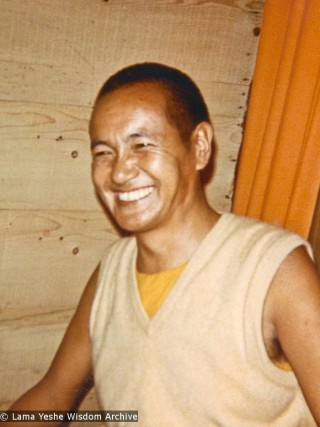
Lama Yeshe, Kopan, 1970, Photo courtesy Lama Yeshe Wisdom Archive.
Lama Zopa Rinpoche has recently reminded FPMT centers to offer extensive Lama Chöpa with Tsog on Losar (Tibetan New Year) in honor of the anniversary of FPMT founder Lama Yeshe’s passing away. Rinpoche added that it would be good to do this at 5 a.m., the time when Lama Yeshe manifested death. This year, Losar is on February 9.
In addition to this, Rinpoche also said for centers to start the tradition of telling stories about Lama Yeshe every Losar to keep his memory alive, for example, by inviting older students who knew Lama to share their favorite stories, or by watching video or reading published stories of Lama. This Losar marks the 32nd year since Lama Yeshe’s passing away.
Losar also marks the beginning of the 15 Days of Miracles, a period when Lord Buddha performed many miracles to benefit others. Lama Tsongkhapa, the founder of the Gelug school, established the Great Prayer Festival (Monlam Chenmo) to coincide with this special occasion in 1409.
Lama Zopa Rinpoche, citing the Vinaya text Treasure of Quotations and Logic, teaches that the karmic results of non-virtuous and virtuous actions are multiplied by one hundred million during Buddha Multiplying Days such as these. It is a very powerful time to practice – such as taking the eight Mahayana precepts, completing nyung näs, and reciting sutras – and strengthen one’s commitment to engaging in virtuous activity.
Find advice and inspiration from Lama Yeshe in the Lama Yeshe Wisdom Archive and on FPMT.org (https://fpmt.org/tag/lama-yeshe).
For more information about Losar, visit Lama Zopa Rinpoche’s Advice page.
- Tagged: buddha multiplying day, lama zopa rinpoche, losar
- 0
29

Kshitigarbha painting. 1.8 million recitations of the long Kshitigarbha mantra are needed to help mitigate possible earthquakes.
In November 2015, Lama Zopa Rinpoche advised students to urgently undertake certain practices to help mitigate a possible earthquake in California and elsewhere in the world. The advice was that the following should be completed by February 1:
- 1,800,000 recitations of the long Kshitigarbha mantra done as part of a Kshitigarbha practice.
- Taking the Eight Mahayana precepts 300 times.
- Performing the extensive Medicine Buddha puja – ongoing.
- Reading of the Tengyur four times – to be done at Sera Je Monastery.
To help organize this, Bay Area FPMT centers set up a Pacify Earthquakes website with information and news about the advice, resources, ways to report or pledge the recommended practices or donate toward Sera Je monks helping to complete part of the advice (reciting the Tengyur four times).
What remains to be completed is the Kshitigarbha mantra recitations. Lama Zopa Rinpoche recently told the Bay Area centers that students should keep going with their mantra recitations until the number is completed, even if this is not completed by February 1. According to the Pacify Earthquakes blog, of the 1.8 million mantras recommended, students have accumulated 751,000 as of January 26. Students around the world are very welcome to participate in the fulfillment of this advice as a strong, collective effort is needed.
The Kshitigarbha practice and long mantra can be found here:
https://fpmt.org/education/prayers-and-practice-materials/#kshitigarbha
You can report your mantra recitations here:
http://www.pacifyearthquakes.org/mantra-recitations/
- Tagged: california earthquake, earthquakes, kshitigarbha
- 0
21
A new free module from Living in the Path program, “The Method to Transform a Suffering Life into Happiness (Including Enlightenment)” is now available on the Online Learning Center.
In this module of Living in the Path, you will find explanations of the three practices Lama Zopa Rinpoche would like his students to do at the beginning of every day: “The Method to Transform a Suffering Life into Happiness (Including Enlightenment),” “Blessing the Speech,” and “Daily Mantras.” A practice containing all three is freely available to students. This new module gives students an opportunity to understand this short, but essential, collection of daily practices.
The commentary for “The Method to Transform a Suffering Life into Happiness” is compiled from various teachings by Lama Zopa Rinpoche given between 2009 and 2015.
The commentaries for “Blessing the Speech” and “Daily Mantras” are mainly extracted from Rinpoche’s teachings given during Light of the Path Retreat 2009 held in North Carolina, USA. They were originally included in Living in the Path, Module 2: Taking the Essence: “Mantras for the Morning.”
You are invited to visit Living in the Path on the FPMT Online Learning Center to see a full list of available modules.
- Tagged: daily meditation, living in the path, the method to transform a suffering life into happiness
- 0
7

Land of Joy property.
A Foundation Service Seminar (FSS) is planned for September 19-25, 2016 at Land of Joy, located at Greenhaugh Hall near Hexham, in Northumberland, UK. This seminar will be lead by Wendy Ridley and Charlotte Elliot.
FSS provides support and training to volunteers and staff offering service within FPMT centers, projects, and services. The seminars help develop a shared understanding of the FPMT mission, creating a firm basis from which to serve effectively and joyfully within FPMT.
The seminar explores how best to offer one’s skills and qualities in service. Participants will investigate the purpose and mission of FPMT and how that vision translates into action for centers, projects, services, study groups, and individuals. For anyone who is serving FPMT (directors, SPCs, board members, staff, volunteers) the FSS is a great opportunity to reconnect with the FPMT family and be inspired by the vast visions of our teachers.
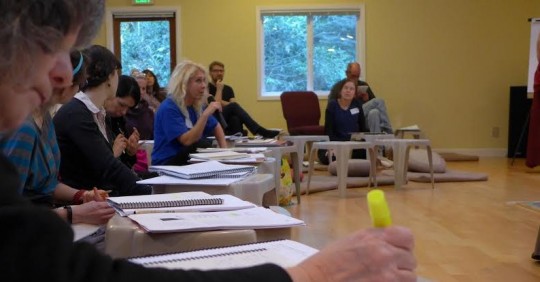
Participants join discussion during a Foundation Service Seminar held at Land of Medicine Buddha, CA, January 2015.
During the five days, participants will explore their relationship to resources — both material and human; communication skills and conflict resolution; teaching according to the level of the student; ways to maintain and develop personal practice in the midst of service, and methods to prevent and cure burnout. Discussions will center around service in terms of guru devotion, karma, compassion, and emptiness. Participants will learn how to draw strength, inspiration, wisdom, and guidance from these practices as well as learn how to use the Inner Job Description, a tool for developing what Lama Zopa calls the “inner professional” for integrating the Dharma into our daily lives.
The seminar includes group discussion, sharing of experiences, and is retreat-like including daily meditations and group practice as advised by Lama Zopa Rinpoche. Creating Lama Yeshe’s “family feeling” is a skill all can learn to employ within our centers and study groups. The FSS is a great opportunity to prepare the next generations of directors, SPCs, board members, staff, and volunteers.
Booking in advance is required for this Foundation Service Seminar. Please book here: www.landofjoy.co.uk/programme/book-a-retreat
- Tagged: foundation service seminar
- 0
24
Following Lama Zopa Rinpoche’s wishes we have updated the text, Daily Meditation, which Rinpoche has renamed The Method to Transform a Suffering Life Into Happiness (Including Enlightenment). In addition to the name change, this text has also been revised according to advice from Lama Zopa Rinpoche, particularly with respect to the mantras and the pronunciation of the Tibetan.
Rinpoche has put a great deal of emphasis on this text and it is recommended as an essential practice for all FPMT students. While mornings are an ideal time to set up one’s aspirations for the day, students are encouraged to engage in this practice at any time, whenever one is able.
You can find this updated practice on our free prayers and practices page, or you may use this direct link.
Through comprehensive study programs, practice materials, training seminars, and scholarships, FPMT Education nourishes the development of compassion, wisdom, kindness, and true happiness in individuals of all ages.
17
Kshitigarbha Practice to Pacify Earthquakes

Kshitigarbha
Lama Zopa Rinpoche recently advised that the following must be completed by February 1, 2016 to help pacify an earthquake that Rinpoche has been predicting will hit California in the very near future:
- 1,800,000 recitations of the long Kshitigarbha mantra done as part of a Kshitigarbha practice.
- Taking the eight Mahayana precepts 300 times.
- Performing the extensive Medicine Buddha puja – ongoing.
- Reading of the Tengyur four times – to be done at Sera Je Monastery.
The advice was given to Bay Area students, but Rinpoche has said that friends around the world can also participate in the accumulation of these practices.
The Bay Area centers have created a website (www.pacifyearthquakes.org) with more information on the advice, including ways to make pledges and report mantra recitations; contribute to the Tengyur recitations; and report the taking of the eight Mahayana precepts.
The main focus is currently on the accumulation of Kshitigarbha mantras. FPMT Education makes available the Kshitigarbha practice in various formats. Students can also listen to Lama Zopa Rinpoche chanting the Ksitigarbha mantra as a way to learn the proper pronunciation.
Please consider getting involved with the Kshitigarbha mantra recitations today as completing Rinpoche’s advice by February 1, 2016 will require strong, collective effort.
The Kshitigarbha practice and long mantra can be found here:
https://fpmt.org/education/prayers-and-practice-materials/#kshitigarbha
Read the USGS Earthquake Outlook for the San Francisco Bay Region 2014–2043 report:
https://pubs.usgs.gov/fs/2016/3020/fs20163020.pdf
- Tagged: california, earthquakes, kshitigarbha
- 0
3
Lama Tsongkhapa Day (Ganden Ngamchoe) Is on December 5
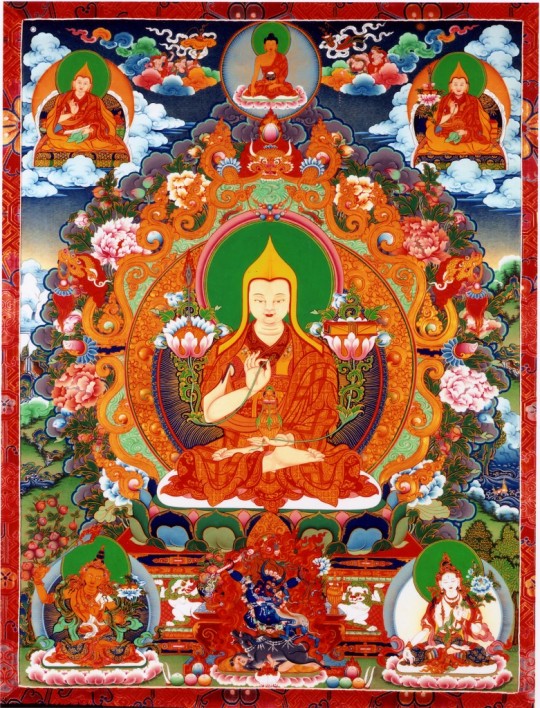
Lama Tsongkhapa (1357-1419), founder of the Gelug lineage.
Lama Tsongkhapa Day, or Ganden Ngamchoe, is a celebration of the anniversary of Lama Tsongkhapa’s parinirvana. It is celebrated on the 25th day of the 10th month on the Tibetan calendar. This year, Lama Tsongkhapa Day falls on Saturday, December 5.
There are many practices one can do to celebrate, and create merit, on this special day. The main practice, recommended by Lama Zopa Rinpoche, is Lama Chöpa. The FPMT Foundation Store makes this practice available in hardcopy and as a downloadable PDF. If you are unable to do Lama Chöpa, Lama Tsongkhapa Guru Yoga is also recommended. Additionally, there are other practices students are encouraged to do, as they are able.
English
- 1000 Offerings to Lama Tsong Khapa
- Extensive Offering Practice
- “The Glorious One of the Three Worlds” (English Version of “Palden Sa Suma”)
- “A Hymn of Experience” by Je Tsongkhapa
- “Destiny Fulfilled”
- “Prayer for the Flourishing of Je Tsong Khapa’s Teachings” (a4 version)
“Prayer for the Flourishing of Je Tsong Khapa’s Teachings” (letter version) - Lama Tsongkhapa’s Secret Biography (C5 version)
- “Dependent Arising: A Praise to the Buddha”
French
- Prière pour le développement de Lama Tsongkhapa (lecture)
- Prière pour le développement de Lama Tsongkhapa (livret)
Tibetan
- 1000 Offerings to Lama Tsongkhapa
- “Palden Sa Suma” (Tibetan Version of “Glory of the Triple Ground”)
- Lama Tsongkhapa’s Secret Biography
You can read more about this advice, plus a teaching from Lama Zopa Rinpoche about Lama Tsongkhapa Day.
- Tagged: lama tsongkhapa, lama tsongkhapa day
- 0
26
Enjoy Your Meal While Making Merit!
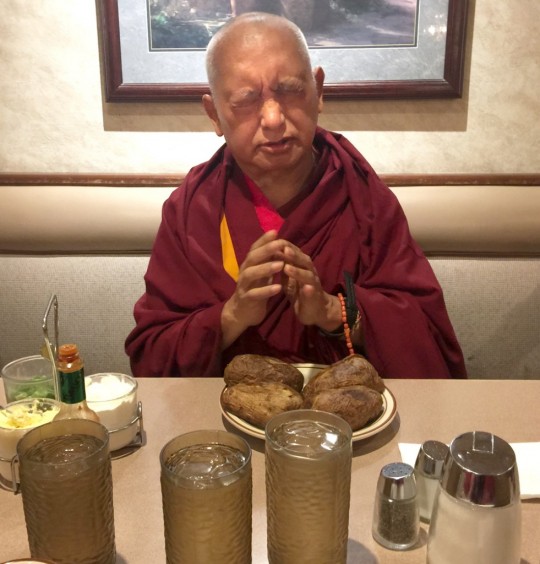
Lama Zopa Rinpoche blessing and offering a meal in California. November, 2015. Photo by Ven. Thubten Kunsang.
This time of year means, for many, an increase in festive meals celebrated with friends and family. There are a variety of ways to enjoy your meal while still practicing virtue.
FPMT Education Services also makes available a collection of practices, Food Offering Practices, which includes an extensive food offering practice, general food offering prayers, and the yogas of eating food according to Hinayana, Mahayana sutra, and Mahayana tantra.
In a recent letter to a student who wanted to know how to bless food sold through a family business, Lama Zopa Rinpoche gave the following short practice:
Regarding your question about blessing the food, you recite OM AH HUM and visualize all the buddhas and bodhisattvas blessing the food with the qualities of holy body, speech and mind. This absorbs into the food where the food is. It is all absorbed into the food.
Then recite OM AH HUM.
Visualize that then every grain and part of the food is a blue HUM and into that numberless buddhas’ and bodhisattvas’ holy body, speech and mind all absorb into that. Then do that quite a number of malas of the mantra (OM AH HUM); the more you do, the better. The HUMs become the grains or food particles.
Then make a prayer to the merit field, Medicine Buddha, Tara and Chenrezig (but particularly Medicine Buddha) and pray that all the buddhas and bodhisattvas bless the food and that there never comes from it any side effects; it immediately purifies, the minute the food goes inside the mouth, it immediately purifies all the negative karmas collected from beginningless rebirths, not only that envy, but all diseases and spirit harms are purified. Also, pray that all realizations from guru devotion up to enlightenment are actualized, all the realizations are generated, especially bodhichitta, and it brings to all sentient beings perfect peace and happiness in this world. Then all the wishes of happiness and all successes – according to holy Dharma – are immediately received. All the wishes up to enlightenment are actualized.
That is what you should pray. You and everyone can do that meditation.
Whatever your traditions this time of year, you can make each meal a meaningful offering for yourself and others. Enjoy!
Through comprehensive study programs, practice materials, training seminars, and scholarships, FPMT Education nourishes the development of compassion, wisdom, kindness, and true happiness in individuals of all ages.
- Tagged: food offering, food offering practice
- 0
19
Living in the Path: Studying Lama Zopa Rinpoche’s Lam-Rim Teachings
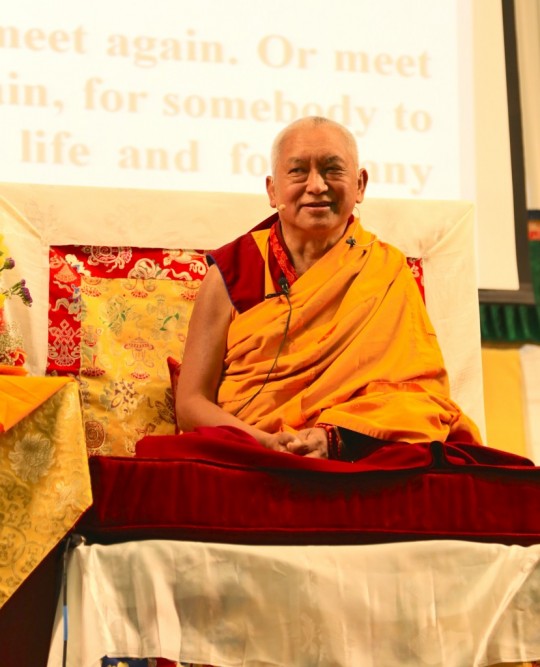
Lama Zopa Rinpoche teaching at the Light of the Path Retreat, May 2014, Black Mountain, NC. Photo by Ven. Photo by Ven. Thubten Kunsang.
Living in the Path is an FPMT online and center-based program drawn exclusively from the teachings of Lama Zopa Rinpoche. In particular, it makes use of teachings given at events recorded by qualified media technicians using high quality video and audio equipment.
While the original modules of Living in the Path were developed on the basis of the Light of the Path retreats held in North Carolina, USA, in 2009 and 2010, new modules are being created to reflect the change in Lama Zopa Rinpoche’s teaching style that followed the manifestation of a stroke in 2011. Since then Rinpoche has been teaching with a force, animation, and speed that clearly transmits the urgent need for us to practice Dharma right now.
Living in the Path was created primarily to transmit Lama Zopa Rinpoche’s very unique way of teaching the path to enlightenment. As such it provides access to Rinpoche’s heart advice on the particular practices he would like his students to do in their daily lives. It also offers Rinpoche’s instructions on why and how to do certain traditional prayers and practices for the purification of negative karma and the collection of merit. In addition, it makes available Rinpoche’s extensive teachings on the lam-rim topics in a format that encourages reflection, meditation, and practice. This is achieved by dividing the teachings into short segments, and supplementing them with guidelines for study and meditation, as well as mindfulness and service practices to be done throughout the day, all of which are based on quotations taken directly from Rinpoche’s teachings.
All the modules of Living in the Path consist of a combination of video excerpts and transcripts of the actual teachings. These are supplemented by video, audio, and text resources aimed at helping students understand and integrate the teachings into their minds.
Given that Lama Zopa Rinpoche’s teachings often assume familiarity with teachings in the Tibetan Buddhist tradition and, in particular, with the lam-rim teachings, students of Living in the Path should ideally have already done some basic introductory courses, such as Buddhism in a Nutshell and Meditation 101, and even some courses at an intermediate level, such as Discovering Buddhism. As Living in the Path is designed to encourage students to go deeply into the essential points of the path and to integrate them into their lives, this program can also be done in conjunction with other FPMT education programs, such as Discovering Buddhism, Basic Program, or Masters Program.
We invite you to visit Living in the Path on the FPMT Online Learning Center study, reflect, and meditate on Lama Zopa Rinpoche’s unique way of presenting the Buddhadharma.
The original modules of Living in the Path are currently being revised and new modules are gradually being created, many of which are offered free of charge. You are invited to visit Living in the Path on the FPMT Online Learning Center to see a full list of available modules.
Centers wishing to host this program can contact the FPMT Foundation Program Coordinator at fpc@fpmt.org. Please note that the teacher of Living in the Path is Lama Zopa Rinpoche and that modules are to be presented in centers by a registered FPMT teacher who is also a registered Living in the Path facilitator.
- Tagged: living in the path, study programs
- 0
12
The Power Behind Prayer Wheels
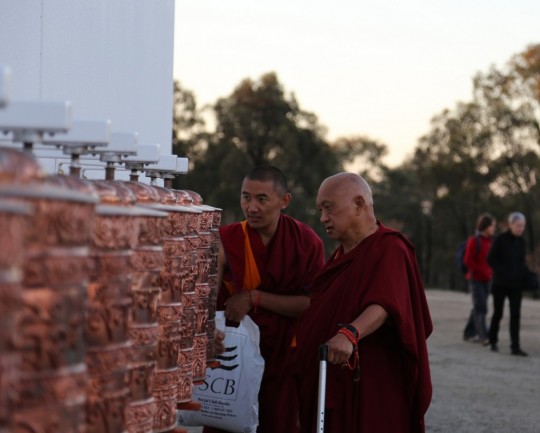
Lama Zopa Rinpoche turning the prayer wheels outside the Great Stupa at dusk, Australia, September 12, 2014. Photo by Ven. Thubten Kunsang
The creation of holy objects is a high priority among Lama Zopa Rinpoche’s Vast Visions for the FPMT organization. “My wish is for FPMT to build many holy objects everywhere, as many as possible,” Rinpoche explained, “Making it so easy for sentient beings to purify their heavy negative karma and making it so easy for sentient beings to create extensive merit. Which makes it so easy to achieve the realizations of the path and so easy to achieve liberation and enlightenment.”
A prayer wheel is a cylindrical wheel on a spindle made from metal. Inside the prayer wheel are many million or billions of the mantra of the Buddha of Compassion, OM MANI PADME HUM, printed on paper or microfilm. By turning the prayer wheel the mantra of compassion emanates and blesses the area and all beings.
Two of Mandala‘s current online features – “The Inside Story: Microfilm, Holy Objects, and the Passion of Tai Vautier” and “How Do Holy Objects Work?” – are excellent resources for exploring the power behind prayer wheels. The first, “The Inside Story” by Donna Lynn Brown, details the work and devotion of FPMT student Tai Vautier, who helped FPMT develop its own collection of sacred mantras on microfilm suitable for filling prayer wheels, statues, and other other holy objects. The second, “How Do Holy Objects Work?” by IMI monk Ven. Tenzin Legtsok, provides a robust introduction to the philosophical reasons behind the spiritual power of holy objects such as prayer wheels.
Lama Zopa Rinpoche has explained that he would like to sponsor the building of 100,000 prayer wheels for world peace (including prayer wheels under the ocean). The prayer wheels are to have a minimum height of six feet. Wherever a prayer wheel is built, it becomes a great blessing for that country.
You can find your own prayer wheel at The Foundation Store.
FPMT’s Holy Objects Fund, provides the resources to create holy objects, such as prayer wheels, for world peace.
More information about prayer wheels can be found on FPMT Education’s prayer wheels resource page.
- Tagged: foundation store, holy objects, prayer wheels
- 0
- Home
- News/Media
- Study & Practice
- About FPMT Education Services
- Latest News
- Programs
- New to Buddhism?
- Buddhist Mind Science: Activating Your Potential
- Heart Advice for Death and Dying
- Discovering Buddhism
- Living in the Path
- Exploring Buddhism
- FPMT Basic Program
- FPMT Masters Program
- FPMT In-Depth Meditation Training
- Maitripa College
- Lotsawa Rinchen Zangpo Translator Program
- Universal Education for Compassion & Wisdom
- Online Learning Center
- Prayers & Practice Materials
- Overview of Prayers & Practices
- Full Catalogue of Prayers & Practice Materials
- Explore Popular Topics
- Benefiting Animals
- Chenrezig Resources
- Death & Dying Resources
- Lama Chopa (Guru Puja)
- Lama Zopa Rinpoche: Compendium of Precious Instructions
- Lama Zopa Rinpoche: Life Practice Advice
- Lama Zopa Rinpoche Practice Series
- Lamrim Resources
- Mantras
- Prayer Book Updates
- Purification Practices
- Sutras
- Thought Transformation (Lojong)
- Audio Materials
- Dharma Dates – Tibetan Calendar
- Translation Services
- Publishing Services
- Teachings and Advice
- Find Teachings and Advice
- Lama Zopa Rinpoche Advice Page
- Lama Zopa Rinpoche: Compendium of Precious Instructions
- Lama Zopa Rinpoche Video Teachings
- ༧སྐྱབས་རྗེ་བཟོད་པ་རིན་པོ་ཆེ་མཆོག་ནས་སྩལ་བའི་བཀའ་སློབ་བརྙན་འཕྲིན།
- Podcasts
- Lama Yeshe Wisdom Archive
- Buddhism FAQ
- Dharma for Young People
- Resources on Holy Objects
- Ways to Offer Support
- Centers
- Affiliates Area
- Teachers
- Projects
- Charitable Projects
- Make a Donation
- Applying for Grants
- News about Projects
- Other Projects within FPMT
- Support International Office
- Projects Photo Galleries
- Give Where Most Needed
- FPMT
- Shop
Translate*
*powered by Google TranslateTranslation of pages on fpmt.org is performed by Google Translate, a third party service which FPMT has no control over. The service provides automated computer translations that are only an approximation of the websites' original content. The translations should not be considered exact and only used as a rough guide.To meet the challenge of our times, human beings will have to develop a greater sense of universal responsibility. Each of us must learn to work not just for his or her own self, family or nation, but for all.







